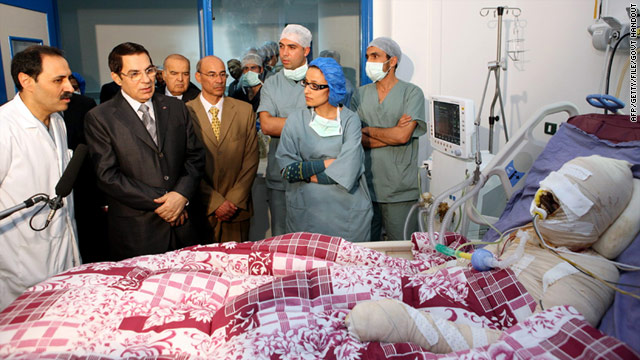
- Al Bouazizi was a poor 26-year old Tunisian who could not find a job
- His attempt to overcome his poverty was halted by a police officer
- On December 17 last year Al Bouazizi set himself on fire
- Al Bouazizi died of his injuries on January 4
If you're in Tunisia, we want to hear your story. Share your photos and video with CNN. Please don't do anything that could put you at risk.
(CNN) -- One figure has played a pivotal role in the tumultuous events that have swept through Tunisia during the past few weeks, resulting in the fall this weekend of President Zine Al Abidine Ben Ali and his regime after 24 years.
But Muhammad Al Bouazizi did not live to see the historic outcome of which he was a key part.
Al Bouazizi was a poor 26-year old Tunisian who could not find a job after finishing college. He refused to join the "army of unemployed youth," as it has become known in Tunisia, and instead started a small business as a street vendor, selling vegetables to support his family.
His attempt to overcome his poverty in the streets of Sidi Bouzid, central Tunisia, was halted by a police officer who seized his goods, claiming that Al Bouazizi was working without the necessary legal permit.
The exact reasons behind Al Bouazizi's subsequent outrage are not clear. Some observers allege that the police officer slapped him across his face; others that Al Bouazizi tried to complain at a center for unemployed graduates -- but that no one listened to him and he heard only laughter and insults.
Whatever his intentions, Muhammad Al Bouazizi's actions changed Tunisian history.
On December 17 last year Al Bouazizi set himself on fire in front of a government building. He remained in hospital for 18 days, fighting severe burns over his entire body. At one point he was visited in hospital by President Zine El-Abidine Ben Ali and a photo was released of the meeting by the presidency.
Khadija Cherif, who works for the Paris-based group Federation of Human Rights Leagues, said he was a "symbol for all the young college graduates who were unemployed, and Bouazizi was a sort of catalyst for the violent demonstrations which followed in the Sidi Bouzid region."
Rioting followed not only in Sidi Bouzid -- a traditional stronghold for opposition against authoritarianism in Tunisia -- but across the country as young and unemployed Tunisians took to the streets to protest against living conditions and the economy.
Al Bouazizi died of his injuries on January 4: 10 days later Zine El Abidine Ben Ali fled with his family to Saudi Arabia.
Each year thousands of young men and women from north Africa try to enter Europe illegally, looking for a better life.
They call themselves "harraka" -- which translates as "the burners" -- because the first thing they do when they reach Europe is to set fire to their passports and documents to avoid being sent back home.
Many in Tunisia now see Al Bouazizi as a "harraka" -- but in his own way.
-- Mustafa Al-Arab of CNN Arabic and Nick Hunt contributed to this story
No comments:
Post a Comment